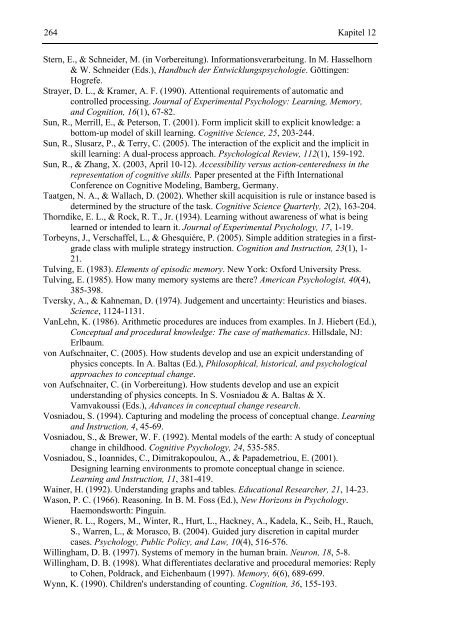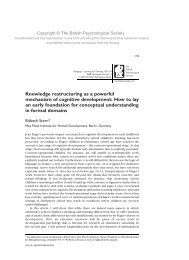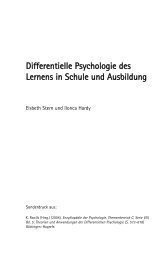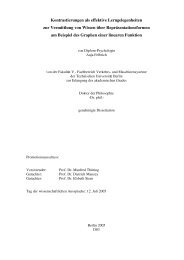Konzeptuelles und prozedurales Wissen als latente Variablen: Ihre ...
Konzeptuelles und prozedurales Wissen als latente Variablen: Ihre ...
Konzeptuelles und prozedurales Wissen als latente Variablen: Ihre ...
Erfolgreiche ePaper selbst erstellen
Machen Sie aus Ihren PDF Publikationen ein blätterbares Flipbook mit unserer einzigartigen Google optimierten e-Paper Software.
264 Kapitel 12<br />
Stern, E., & Schneider, M. (in Vorbereitung). Informationsverarbeitung. In M. Hasselhorn<br />
& W. Schneider (Eds.), Handbuch der Entwicklungspsychologie. Göttingen:<br />
Hogrefe.<br />
Strayer, D. L., & Kramer, A. F. (1990). Attentional requirements of automatic and<br />
controlled processing. Journal of Experimental Psychology: Learning, Memory,<br />
and Cognition, 16(1), 67-82.<br />
Sun, R., Merrill, E., & Peterson, T. (2001). Form implicit skill to explicit knowledge: a<br />
bottom-up model of skill learning. Cognitive Science, 25, 203-244.<br />
Sun, R., Slusarz, P., & Terry, C. (2005). The interaction of the explicit and the implicit in<br />
skill learning: A dual-process approach. Psychological Review, 112(1), 159-192.<br />
Sun, R., & Zhang, X. (2003, April 10-12). Accessibility versus action-centeredness in the<br />
representation of cognitive skills. Paper presented at the Fifth International<br />
Conference on Cognitive Modeling, Bamberg, Germany.<br />
Taatgen, N. A., & Wallach, D. (2002). Whether skill acquisition is rule or instance based is<br />
determined by the structure of the task. Cognitive Science Quarterly, 2(2), 163-204.<br />
Thorndike, E. L., & Rock, R. T., Jr. (1934). Learning without awareness of what is being<br />
learned or intended to learn it. Journal of Experimental Psychology, 17, 1-19.<br />
Torbeyns, J., Verschaffel, L., & Ghesquiére, P. (2005). Simple addition strategies in a firstgrade<br />
class with muliple strategy instruction. Cognition and Instruction, 23(1), 1-<br />
21.<br />
Tulving, E. (1983). Elements of episodic memory. New York: Oxford University Press.<br />
Tulving, E. (1985). How many memory systems are there? American Psychologist, 40(4),<br />
385-398.<br />
Tversky, A., & Kahneman, D. (1974). Judgement and uncertainty: Heuristics and biases.<br />
Science, 1124-1131.<br />
VanLehn, K. (1986). Arithmetic procedures are induces from examples. In J. Hiebert (Ed.),<br />
Conceptual and procedural knowledge: The case of mathematics. Hillsdale, NJ:<br />
Erlbaum.<br />
von Aufschnaiter, C. (2005). How students develop and use an expicit <strong>und</strong>erstanding of<br />
physics concepts. In A. Baltas (Ed.), Philosophical, historical, and psychological<br />
approaches to conceptual change.<br />
von Aufschnaiter, C. (in Vorbereitung). How students develop and use an expicit<br />
<strong>und</strong>erstanding of physics concepts. In S. Vosniadou & A. Baltas & X.<br />
Vamvakoussi (Eds.), Advances in conceptual change research.<br />
Vosniadou, S. (1994). Capturing and modeling the process of conceptual change. Learning<br />
and Instruction, 4, 45-69.<br />
Vosniadou, S., & Brewer, W. F. (1992). Mental models of the earth: A study of conceptual<br />
change in childhood. Cognitive Psychology, 24, 535-585.<br />
Vosniadou, S., Ioannides, C., Dimitrakopoulou, A., & Papademetriou, E. (2001).<br />
Designing learning environments to promote conceptual change in science.<br />
Learning and Instruction, 11, 381-419.<br />
Wainer, H. (1992). Understanding graphs and tables. Educational Researcher, 21, 14-23.<br />
Wason, P. C. (1966). Reasoning. In B. M. Foss (Ed.), New Horizons in Psychology.<br />
Haemondsworth: Pinguin.<br />
Wiener, R. L., Rogers, M., Winter, R., Hurt, L., Hackney, A., Kadela, K., Seib, H., Rauch,<br />
S., Warren, L., & Morasco, B. (2004). Guided jury discretion in capital murder<br />
cases. Psychology, Public Policy, and Law, 10(4), 516-576.<br />
Willingham, D. B. (1997). Systems of memory in the human brain. Neuron, 18, 5-8.<br />
Willingham, D. B. (1998). What differentiates declarative and procedural memories: Reply<br />
to Cohen, Poldrack, and Eichenbaum (1997). Memory, 6(6), 689-699.<br />
Wynn, K. (1990). Children's <strong>und</strong>erstanding of counting. Cognition, 36, 155-193.





